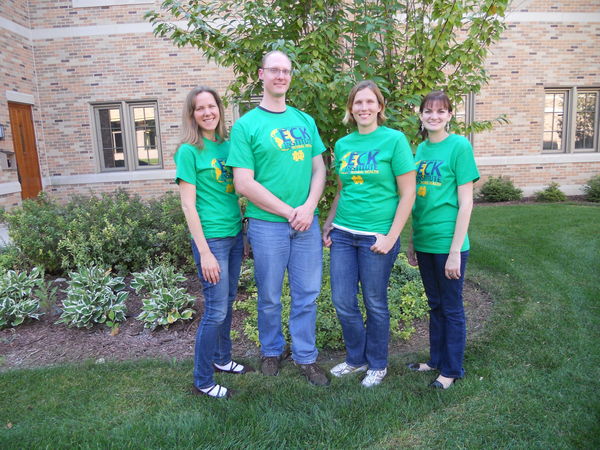Through a competitive process, the Eck Institute for Global Health has selected seven outstanding University of Notre Dame PhD candidates who will receive fellowships for the 2012-2013 year. Four of the awards are new and three are second year renewals. Selection of fellows was based on the student’s academic standing, scholarly activities, and merit of their research program and its relevance to the mission of the Eck Institute for Global Health. The fellowship will allow students to focus on their global health-related research projects and, thereby, contribute to bringing new knowledge to global health solutions. Students will also participate in Eck Institute for Global Health activities, allowing them to become part of a greater global health research community. Each student’s research is focused on a significant constraint to the health of the poorest people: leishmaniasis, malaria, tuberculosis, Viral Hemorrhagic Fever (caused by the Ebola virus), dengue fever, cardiovascular disease, and detection of counterfeit drugs.
The four new awards went to: (left to right)
 Abigail Weaver is a third year PhD candidate in the Chemistry and Biochemistry Department and is co-advised by Associate Professors Marya Lieberman and Holly Goodson. Weaver is developing paper-based analytical devices to detect counterfeit β-lactam antibiotics, TB medications, and artemisinin combination therapies (used to treat malaria). The devices are simple to use, low cost, and designed to be read with a cell phone camera. Counterfeit or poor quality drugs are a major problem in health care delivery in developing countries.
Abigail Weaver is a third year PhD candidate in the Chemistry and Biochemistry Department and is co-advised by Associate Professors Marya Lieberman and Holly Goodson. Weaver is developing paper-based analytical devices to detect counterfeit β-lactam antibiotics, TB medications, and artemisinin combination therapies (used to treat malaria). The devices are simple to use, low cost, and designed to be read with a cell phone camera. Counterfeit or poor quality drugs are a major problem in health care delivery in developing countries.
Nicholas Geraci is a fourth year PhD candidate in the Department of Biological Sciences and is advised by Associate Professor Mary Ann McDowell. With six peer-reviewed publications, Geraci has already demonstrated this, which is a significant accomplishment at this stage of his training. Geraci will evaluate how the role of host cell microRNAs are involved in the immunopathology of leishmaniasis. Leishmaniasis is a sand fly vector borne infectious disease that manifests in three primary pathological forms: cutaneous, mucocutaneous, or visceral. A deeper understanding of the disease pathobiologies related to each of these forms will pave the way for more effective clinical interventions.
Lindsey Turnbull is a third year PhD candidate in the Department of Biological Sciences and is advised by Associate Professor Michael Ferdig. The title of her research proposal is, “Plasticity of Transcriptional Response and Implications for Malaria Parasite Adaptation.” She seeks to extend research in model experimental organisms about plasticity of gene expression and its influence on robustness to the more experimentally challenging malaria parasite that significantly impact human health.
Emily Williams is a third year PhD candidate in the Department of Biological Sciences and is advised by Assistant Professor Patricia Champion. Williams’ research will focus on the molecular mechanisms of Mycobacterium tuberculosis virulence. Tuberculosis currently infects a third of the world’s population and was responsible for the death of 1.4 million people in 2010. Her research will contribute new information relevant to the identification of targets for antibiotics and vaccine development.
Three of last year’s fellows, Anthony Clemons (Molly Duman-Scheel and David Severson), Emmanuel Adu-Gyamfi (Robert Stahelin), and Ling Sun (Philippe Sucosky), received a one year renewal. Ellen Flannery will complete her PhD program this fall under the direction of Assistant Professor Molly Duman-Scheel and will be going on to a postdoctoral fellowship position at the National Institutes of Health in the laboratory of developmental neurobiologist Dr. Susan Wray. (see news article on the 2011-2012 fellows)